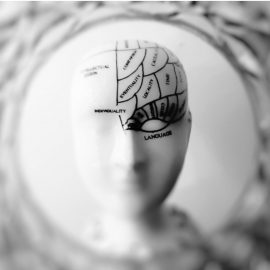

This article is an excerpt from the Shortform book guide to "That Little Voice In Your Head" by Mo Gawdat. Shortform has the world's best summaries and analyses of books you should be reading.
Like this article? Sign up for a free trial here.
What are the four types of information the brain consumes? What’s the difference between interpretations and inaccurate information?
Mo Gawdat says there are four main categories of information that the brain takes in: sensory information, interpretations, recurring thoughts and emotions, and inaccurate takes. Your brain reacts differently to every type, so you must consume the right kind of information.
Here are details about the four types of information.
Types of Information the Brain Consumes
Gawdat explains that our brain takes in four types of information:
1. Sensory information: This is information we observe with our five senses—things we see, hear, smell, touch, or taste. For example, someone is shouting—you know this because you heard it. These inputs are objectively accurate and true.
(Shortform note: While common knowledge tells us we have five senses, scientists suggest we may be oversimplifying things. People can develop “vestigial” senses as well. For example, some blind people can determine their location by picking up on echoes rebounding off their surroundings—a skill not innate to our ability to hear. Further, Russian and American scientists hypothesize that a rare sixth sense called “fingertip sight” may exist after discovering a few cases where people were able to accurately identify colors by touch.)
2. Interpretations: This information encompasses things we believe to be true based on our experiences and underlying beliefs. For example, there’s a fight happening—you know this because you hear shouting, and when there’s shouting, there’s a fight. However, these inputs are not objectively true and can be inaccurate.
(Shortform note: In The Happiness Trap, Russ Harris explains that when we confuse our interpretations for reality—for example, equating shouting with there being a fight—we enter a state called “fusion.” Being in a state of fusion can lead to suffering because we immediately believe our thoughts and judgments, which are often negative, to be true. To get out of this state, we need to undergo a process called “defusion.” We’ll talk more about defusion in later commentary.)
3. Recurring thoughts and emotions: These thoughts and emotions crop up in your mind frequently and without any external trigger. For example, you’re driving to work and all of a sudden you start thinking that no one likes you, and you start feeling resentful. Our recurring thoughts tend to trigger our recurring emotions. These inputs are often untrue and inaccurate because they stem from interpretations.
(Shortform note: Recurring thoughts and emotions happen to everyone occasionally, but intense and frequent experiences may indicate Obsessive Compulsive Disorder (OCD). People with OCD experience recurring thoughts, emotions, mental images, and urges to act—for example, wanting things in a certain order or constantly needing to check whether the door’s locked. If you experience these symptoms and can’t control them, spend more than an hour a day on them, feel temporary anxiety relief when you perform them, or experience significant problems in daily life because of them, psychologists recommend seeking professional help.)
4. Inaccurate takes: These are external sources of information and influence that, bit by bit, cause us to form an inaccurate concept of reality. For example, listening to your parents’ beliefs while you were growing up shapes your perception of reality. Or seeing models with perfect skin all over Instagram makes you think that having a pimple makes you flawed. These inputs are often untrue and inaccurate as they stem from curated or incomplete ideas of what things “should” be.
(Shortform note: In The 7 Habits of Highly Effective People, Stephen R. Covey agrees that many of the beliefs that form our concept of reality are influenced by external factors—these patterns of thinking are called paradigms. He explains that the solution to overcoming paradigms that often cause us harm is to replace them with perspectives that are based on your principles—for example, fairness, integrity, honesty, growth, and patience.)
Gawdat explains that sensory information is the only type of information we can rely on to produce happiness. This is because it’s the only type of information that’s objectively true and accurate, and therefore, the only type of information that our brains can rationally understand and effectively act on. On the other hand, interpretations, recurring thoughts and emotions, and inaccurate takes are not objective truths and are often skewed negatively. Therefore, they tend to produce inaccurate understandings of reality that cause unhappiness. We’ll specify how inaccurate thoughts cause unhappiness in the sections below.
(Shortform note: The argument Gawdat makes here has been a hot topic of debate in philosophy for centuries—so much so that it’s divided the discipline into two camps. The first camp, empiricists, would agree with Gawdat’s claim that only sensory information can be accepted as truth. Many modern philosophers such as René Descartes and Baruch Spinoza fall into this camp. On the other hand, rationalists like Plato and Socrates believe that you must use reason and intellect—your interpretations—to gain true knowledge about the world.)

———End of Preview———
Like what you just read? Read the rest of the world's best book summary and analysis of Mo Gawdat's "That Little Voice In Your Head" at Shortform.
Here's what you'll find in our full That Little Voice In Your Head summary:
- How to understand and program your brain to produce positive actions and emotions
- The four processing errors that cause our brains to produce unhappiness
- Why you should get into the flow state more often






